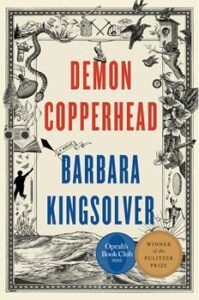 Dickens in Appalachia
Dickens in Appalachia
Review by Jeb Harrison
Barbara Kingsolver’s Pulitzer-winning novel, Demon Copperhead, can be a bit of a vexing read, at first. The author’s uncanny ability to inhabit the mind of a child born into poverty in Lee County, Virginia, results in a syntactical soup of bassackwards sentences, floating fragments, and a “hillbilly” POV that takes some getting used to. Unlike first person narratives like Harlan Coban’s Riddley Walker, Winston Groom’s Forrest Gump and Twain’s The Adventure’s of Huckleberry Finn, it is not the narrator’s language, per se, that throws the reader off, rather it is the sentence structure, the mixup of parts and phrases. If it were an 8th grade essay, it would be bleeding with red pen.
The first sentence serves as a warning: “First I got born.”
Nonetheless, the patient reader is handsomely rewarded, particularly fans of Charles Dickens David Copperfield, on which the story is proudly and lovingly based. Like Copperfield, it is an orphan’s narrative, transposed from the industrial detritus of 19th century England to opioid-stricken Appalachia in the nineties. And, like Copperfield, it is an indictment of American society. As Kingsolver wrote: “I’m grateful to Charles Dickens for writing David Copperfield, his impassioned critique of institutional poverty and its damaging effects on children in his society.”
The parallels to David Copperfield, were, for a Dickens fan like myself, really fun and entertaining. Demon Copperhead (a nickname based on his melungeon green eyes and coppery hair) is born into a messy situation: teen mom, dead dad, abusive stepfather, squalid trailer-in-the-holler living. Kingsolver obviously had fun naming the characters. There’s the Peggots (Peggoty), the devious Fast Forward (Steerforth), the McCobbs (McCawbers), Angus (Agnes), the extortionist U-Haul (Uriah Heep) and the airheaded, drug-addled girlfriend, Dori, who Demon fawns over like David fawned over Dora. The true Copperfield expert would find many more I’m sure.
Like Beth Macy’s non-fiction account of opioid-mania in Appalachia, Dopesick, (made into a mini-series starring Michael Keaton), Kingsolver’s mission–the takeaway, as it were–is to expose the social conditions, along with the bloodsucking leeches at Purdue Pharma, that have fueled the continuing opioid epidemic, particularly in impoverished areas. There is no shortage of horrifying imagery and hair-raising events, but in the end young Demon Copperhead earns our respect, if only for surviving it all.

